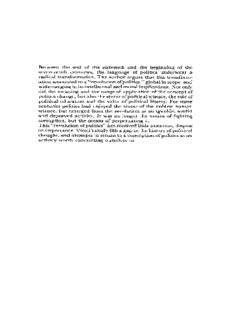
From politics to reason of state: the acquisition and transformation of the language of politics, 1250–1600 PDF
Preview From politics to reason of state: the acquisition and transformation of the language of politics, 1250–1600
Introduction Between the end of the sixteenth and the beginning of the seventeenth century, the language of politics underwent a radical transformation which could be called "the revolution of politics," even if the word "revolution" sounds somewhat too dramatic. Like all serious revol- utions, it was global in scope, and had a wide range of intellectual and moral implications. Not only did the meaning and the range of application of the concept of "politics" change, but also the ranking of political science, the role of political education and the value of political liberty. The revolution entailed a loss of prestige. Having enjoyed for three centuries the status of the noblest human science, politics emerged from the revolution as an ignoble, depraved and sordid activity: it was no longer the most powerful means of fighting corruption, but the art of conforming to, and perpetuating, it. Inspite of its magnitude, the "revolution of politics" has received v£ry little attention. This study attempts to fill this gap in the history of political thought. The story begins in the thirteenth century, when a shared language of politics reappears in Italy, and ends in the seventeenth century, when politics became a synonym for reason of state. To be sure, all through the seventeenth century, learned men continued to invoke the restoration of the idea of politics as the noble art of good government. Their efforts, however, did not succeed in fighting back reason of state, nor did they prevent the decline of the notion of politics as the art of good government. The chronological and geographical boundaries of the story are, to a degree, arbitrary. Different stories of politics and reason of state could be told which would certainly be more interesting. One could begin with Plato's contrast between the political man and the tyrant and trace the dispute between the champions of Realpolitik and the advocates of political ethics up to the present.1 In addition to Italy, a 1 This objection was made by Norberto Bobbio and Michelangelo Bovero during a seminar in Turin on December 21, 1990. I am deeply grateful to both for their criticisms.
Description: